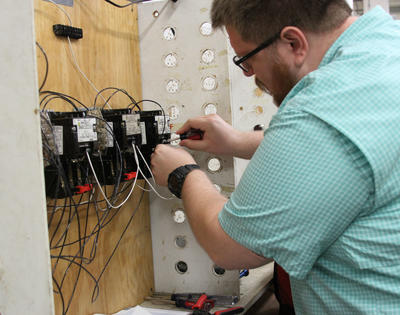Electrical Technology Program

Electricians are always in demand in a growing economy. Since 1930, the U.S. has steadily increased its use of electrical power, and the trend will continue well in the next century. This increase creates a growing demand for individuals who are trained in technology and possess skills which will qualify them for employment in the exciting field of Electrical Technology.
Areas of Training
| fall semester | spring semester |
|---|---|
|
AC/DC Circuits |
National Electrical Code |
Instruction
 Troubleshooting electrical equipment and installation is covered throughout the course. Standard troubleshooting techniques are employed using blueprints and electrical meters. The first segment covered is residential wiring. In this section, students will learn how to wire a total electric home through classroom and shop wiring assignments. Students will gain hands-on experience in wiring 2x4 studding just like an actual house. Estimating electrical wiring costs from blueprints is also covered.
Troubleshooting electrical equipment and installation is covered throughout the course. Standard troubleshooting techniques are employed using blueprints and electrical meters. The first segment covered is residential wiring. In this section, students will learn how to wire a total electric home through classroom and shop wiring assignments. Students will gain hands-on experience in wiring 2x4 studding just like an actual house. Estimating electrical wiring costs from blueprints is also covered.
The motors section of training will stress the most common types of motors in industry. An electrician must be proficient in working on a variety of types of motors, as this is what converts electrical power to mechanical motion. Having a thorough working knowledge of the fundamentals of electricity is also equally important. In this class, students will learn what a volt, amp, and ohm is as well as the different characteristics of series and parallel circuits, theory and application of voltage drop, operation of inductive and capacitive type loads, and basic electrical laws applied to a circuit. This is just a sample of the variety of areas covered in this course.
Program Contact
Tyler Cook
Instructor
[email protected]
620-252-7514
Fast Facts
Salary
$35k to $50k per year.
Experienced, $57k per year.
Jobs
Electrician (Residential and Commercial)
Industrial Maintenance
Construction
Cable Technology
Phone Technology
9 Month Program


